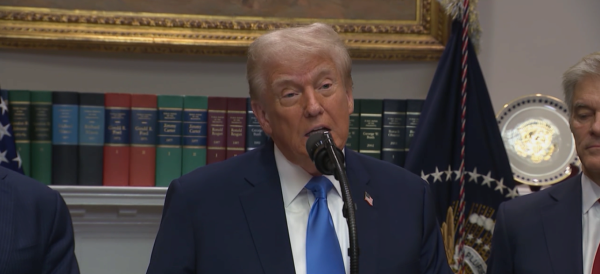Last month, the Trump Administration publicly stated that children of mothers who took acetaminophen during their pregnancy are more likely to have autism. This claim of a causal relationship between Tylenol and autism has not been backed up by previous research and has been actively disproved by experiments conducted with sibling controls. The evidence against this accusation indicates that the federal government may have been employing a scare tactic designed to cause confusion and direct attention away from real-world problems.
When speaking on the topic of autism diagnoses rising in number, President Trump referred to the occurrence as “among the most alarming public health developments in history” and connected the circumstance to pregnant women taking Tylenol. He further urged soon-to-be mothers to “fight like hell” against taking this fever-reducing medication.

However, many disagree with the way the current government has handled this information, especially since it has not been definitively proven whether Tylenol causes autism at all and the rise in diagnoses is far more likely due to better diagnostic methods.
“There is no research that supports [this] cause-and-effect relationship,” stated Dr. Michael Austin, a long-time pediatrician with a special interest in mental health. “Most research supports a genetic basis for autism and other neurodevelopmental disorders.”
While some studies have found a connection between acetaminophen and child development, Dr. Austin clarified that “association does not, in any way, equal causation,” further claiming “no study has been done to look at other factors that might be involved…that might lead to the use of Tylenol.”
When asked how he would respond to a pregnant woman trying to avoid taking Tylenol during her pregnancy, Dr. Austin said, “I would encourage women to talk to their doctors, [but] there is no safer alternative for treating pain and fever during pregnancy, and ‘toughing it out’ also holds risks.”
Christine Creek, head of the Special Education department at Champaign Central High School, said that her initial thought after hearing President Trump’s statement was “I really want to see the data.”
In search of that data, Creek worked to find studies that had been conducted which looked at Tylenol and autism. Her takeaway was that these “blanket” claims about such a complex matter are “too much of a leap.” She added that “Autism Spectrum Disorder is [so] complicated… [that] to tie that back effectively to a singular thing will be almost impossible.”
The difficulty of this accomplishment indicates that more time should be given to studying the many factors which go into autism and those looking at these studies should be careful to avoid oversimplification.
Many people share this point of view when regarding the oversimplified comments President Trump made about complex medical topics. However, the potential harm to current and future mothers is not the only negative to come out of these claims. President Trump’s strict insistence that rising autism diagnoses are in strong need of fighting does not sit well with many people in and around neurodivergent spaces.
“I have seen firsthand how the Tylenol claim has hurt the feelings of my students who have autism,” said Cheryl Morton, a teacher at Champaign Central High School. “[It] insinuates that people with autism are ‘less than’ or unwanted, or that autism is something to be feared or avoided.”
Morton went even further to state that she “does not believe the Trump Administration values neurodivergent people if they believe that expecting parents should not take Tylenol in order to avoid having a child with Autism.”
Many people with autism, and those with any amount of neurodivergence, are told throughout their lives that they must fit in the box of “normal” society. These expectations are often harmful and have only been made more powerful by President Trump’s recent claims.
Aleah Frye, a student at Champaign Central, stated that the Trump Administration’s claims “ostracize the neurodivergent community more than they already have been [and] present them as a problem instead of a people.”
Frye is not the only one who feels that the statements about Tylenol and autism are working to dehumanize and disparage neurodivergent people, her classmate Lily Haydel had similar views of the topic.
“[The Trump Administration] thinks neurodivergent people are freaks and should be shunned for simply existing.” She said, “[Like] it’s a disease that needs to be stopped.”
While autism is classified as a disorder, Haydel is not the only one who feels that it should not be viewed as a problem in need of fixing. Samantha Heath, another Central student, who also feels that autism should not be viewed negatively just because it is outside of the norm.
“Let autism exist. Autistic people can do so many things differently from neurotypical people, and we need other people who think differently.” Heath went on to say that, “the Trump Administration thinks lowly of anyone who [does not fit their traditional standards].”
Dr. Austin’s final statement summarized the Trump Administration’s breach of contemporary medical standards succinctly.
“[Robert F. Kennedy Jr.] is neither a scientist nor a physician. Public Health guidelines should never be made based on anything other than facts, data, and good research.”

















































Keira • Oct 28, 2025 at 9:12 am
I like how you included multiple quotes from their perspectives on the matter. Also, the descriptive words.